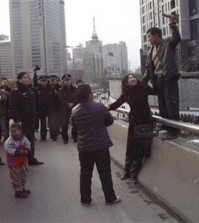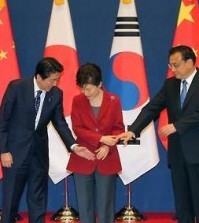- California Assembly OKs highest minimum wage in nation
- S. Korea unveils first graphic cigarette warnings
- US joins with South Korea, Japan in bid to deter North Korea
- LPGA golfer Chun In-gee finally back in action
- S. Korea won’t be top seed in final World Cup qualification round
- US men’s soccer misses 2nd straight Olympics
- US back on track in qualifying with 4-0 win over Guatemala
- High-intensity workout injuries spawn cottage industry
- CDC expands range of Zika mosquitoes into parts of Northeast
- Who knew? ‘The Walking Dead’ is helping families connect
‘Hallyu’ industry worried about losing talents to China
Entertainment firms seek new business models of collaboration

Stars of Korean drama “My Lovely Girl,” including Rain, left, Krystal, third from left, and L, first from right, pose during a press event prior to the drama being broadcast. The drama, with a cast of K-pop stars, has been sold to China, with transmission rights costing $200,000 per episode. (Korea Times file)
By Kim Ji-soo
The Korean drama “My Lovely Girl,” starring Rain and several other K-pop stars including f(x)’s Krystal, and L and Hoya of Infinite, hit the airwaves in September to Korean fans’ concern that the drama had more pop stars than actors.
However, the drama, which is a thinly veiled portrayal of the K-pop scene and talent agencies, is a big hit in China. It has been viewed 100 million times in China in early October.
Previously, transmission rights for the drama were sold at a record $200,000 per episode via Youku-Tudou, topping the price for “My Love from the Star,” which was also a runaway hit in China in the first half of this year. The transmission rights for “My Love,” which starred actors Kim Soo-hyun and Jun Ji-hyun, were sold for only $40,000 per episode.
Korean contents were once hot in Japan but are now lagging behind. It’s a different story in China, where Korean contents are so popular that Chinese companies are advertising on Korean dramas such as SBS’s “Dr. Stranger.”
The surging demand for Korean contents, however, is causing some problems. One is a brain drain in the “hallyu” industry. The producer Jang Tae-yoo of “My Love” has signed with China’s Yuehua Entertainment for five years. The Hong sisters of Hong Jeong-eun and Hong Mi-ran, who wrote the script for “Best Love” starring Cha Seung-won and Gong Hyo-jin, are currently working on a romantic comedy for the Chinese market
Another concern is the copycat nature of the business. For example, the Chinese drama “Heirs from the Star” interestingly combines the titles of two of the hottest dramas of “My Love from the Star” and “The Heirs” that were aired in China in the first half of the year.
The Chinese drama industry is also reportedly looking to enter the Korean market. MaxTimes Korea, which imports Korean dramas, is reportedly considering working together with a Korean drama production company.
“The Korean drama industry is very competitive in terms of production rather than the stories and Chinese dramas can improve by learning the Korean production (system),” said Quan Xianglan, CEO of MaxTimes Korea, explaining why her company is looking to collaborate with Korean drama companies. Quan said such joint projects will not mean a decrease in the quality of Korean dramas.
“I don’t think Korean drama companies working together with Chinese ones pose a threat, because Korean dramas will continue to improve and audiences have different tastes,” Quan said.
The Chinese authorities have strengthened regulations on Korean dramas, which have recently gained immense popularity through Chinese video-sharing sites Youku, Tudou and Iqiyi. The regulations require foreign dramas to acquire a permit to show on these sites and to register with the State Administration of Radio, Film and Television by March 31.
And it’s not only Korean dramas China is interested in. Chinese investors are also reportedly approaching Korean entertainment agencies. This year, Chinese company Sohu.com, a Chinese Internet company, acquired stakes in Korean talent agency Keyeast, which is led by top hallyu star Bae Yong-joon and is also home to “My Love” actor Kim Soo-hyun.
Joint Korean and Chinese cinematic projects are increasing as well, most likely boosted by Korean President Park Geun-hye and Chinese President Xi Jinping’s agreement in June to boost collaboration in the field. The film “A Wedding Invitation,” jointly produced by Korean and Chinese companies, broke even just two days after being released in China in 2013.

YG Family concert featured its artists Psy, Big Bang and 2NE1 in Taiwan last month. The top Korean entertainment company has been actively advancing into the China market.
Hallyu-related companies such as entertainment agencies and contents producers believe business growth and opportunities do not come without risk.
“In our cinema division, we believe working with our Chinese counterparts produces great synergy and an immense opportunity to expand into the global contents market,” a spokesman at CJ E&M said. He added that in cooperative projects, Korean and Chinese companies team up in each process, including production, creation, distribution, marketing and casting.
Chinese companies are tapping into the hallyu market as part of their expansion strategies, and Korean companies are doing the same in the Chinese market.
The Chinese contents market grew to $138 billion in 2013, up from $87.8 billion in 2009. While exports to Japan still account for the largest portion of Korean content exports at around $1.3 billion in 2013, Chinese exports are a close second at around $1.2 billion, according to the Ministry of Culture, Sports and Tourism. Chinese content exports jumped 27.6 percent from 2010 through 2012, suggesting that China will soon overtake Japan as the No. 1 Korean contents importer.
In an interview with Yonhap, Yang Min-seok, CEO of YG Entertainment, said he saw the increased interest of China in Korean contents as an opportunity because “no opportunity comes without risk.”
Kim Gi-hun, manager of the Beijing office of the Korea Creative Content Agency, said the current situation indicates the significant demand for Korean content, need for investment in Korean content companies and Chinese funds available for investment irrespective of borders.
“The Korean entertainment industry needs to think about what it needs to do from now on, what it needs to do in the next five years,” Kim said. “Will Korean contents still be attractive?”

















Pingback: 진짜?!: K-Drama Buzz for Monday, November 17, 2014 | Noonas Over Forks